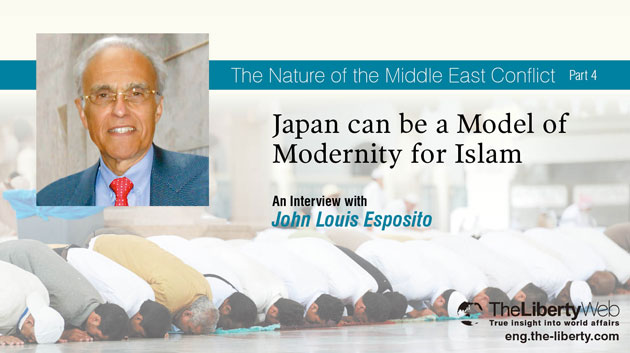Japan Can Be a Model for Modernization
John L. Esposito
Georgetown University
Profile:
Born 1940. University Professor and Professor of International Affairs and of Islamic Studies at Georgetown University. Founding Director of “Prince Alwaleed Bin Talal Center for Muslim-Christian Understanding” which seeks religious understanding between Islam and the West. Esposito is a former president of the American Academy of Religion and the Middle East Studies Association. He continues to research Islam and democracy, global terrorism, and has some 45 books including “Who Speaks for Islam? What a Billion Muslims Think” and others, many published in some 35 languages including Japanese,
We asked Professor Esposito from Georgetown University regarding his thoughts on the current turmoil in the Middle East.
Q. What is the fundamental reason for the conflict in the Middle East?
A. The primary drivers are political. Religion comes into play, but it usually plays more of a role of providing legitimacy, recruiting, and localizing.
Iraq is a good example. It’s easy to say it’s a Sunni-Shia conflict, but the primary drivers are really not deeply theological, there’s a lot of politics involved there.
In Iraq, what you had was a country under Saddam, where you had a Sunni minority dominating a Shia majority. And not only dominating, but also discriminating against, and at times butchering its Shiah population. So now you get Shia dominance, and under Prome Minister Maliki, there was a tendency not just for Shia to assert their majority, but to marginalize Sunnis. This included when Maliki decided to go after the elected Sunni vice president on corruption charges and forced him out of the country. So a lot of that contention is about a turf war, and a struggle for influence and power. Unless the new government, the replacement of Maliki, develops a government that’s more inclusive, and that reassures groups like the Sunnis and others, no amount of citing religion is going to help.
As a result, some of the Sunnis have been open to ISIS coming in. Because ISIS is Sunni, they condemn Shia on religious grounds. It’s convenient for them to use religious grounds to legitimize what they’re doing.
Q. What can religion do to reconcile religious conflict?
A. Well, I think religion can play a role, but it’s going to be difficult. We’ve had a group letter, “letter to Baghdadi”, which has pages of condemnation of how his actions are not Islamic. But number one, it’s not something ISIS is going to listen to, and number 2, that alone is not going to be effective in turning around the situation. That’s because, in addition to everything, what a lot of people forget is, some of the drivers are things like the experience or perception of occupation.
Combine that with the fact that neither the Old Testament nor the Koran say you have to turn the other cheek. You have a perfect right to defend yourself or your religion. In the Old Testament, for example, while God is often seen as compassionate in the Old Testament, he’s also a very strong judge who often commands violence. It’s the same God, but they show different sides depending on the context as read from the passages in the texts. In either case, both Judaism and Islam (and Christianity as well) permit the right of self-defense.
In Israel/Palestine, the Palestinian-Israeli conflict is not simply going to be decided by appealing to Palestinian Muslims and Christians and Israel Jews in terms of religion. You have to go and deal with the occupation of Palestinian lands and issues of security etc and most importantly the creation of a Palestinian state.
Q. Does Islam as a religion need to be reformed for Islam to modernize?
A. Religious reform is important, and that’s true in any religion. But unless societies are reformed, there’s no movement forward.
For example, after Mubarak, in Egypt’s first democratic election, a civilian, Mohammed Morsi, a member of the Muslim Brotherhood, became the first democratically elected president.. But a year later in the midst of widespread protest demonstrations, the bureaucracy, the courts, the military, the police, the security forces, who were all Mubarak appointees, contributed to the military led-coup rather than resorting to the electoral. The result has been the restoration of authoritarian rule, more repressive than any of its predecessors.
Majorities of people in the Muslim world want Western technology, education, and rule of law, democracy, and accountable government. But majorities also believe that religion should be part of their society. In other words, a hard interpretation of the Enlightenment is that it changed 180 degrees, in theory anyway, the world view that existed before. Before, the pre-enlightenment worldview was that God was at the center. After the enlightenment, human beings are at the center, and everything has to be validated by empiricism and science. But the reality is that, religion has proven to be an enduring reality in many countries. In most Muslim countries, as major polls by Gallup and PEW report, most want democracy but not western secularism. They see their religious and cultural values as important to their identity and society. It may take many years , but most Muslim countries in diverse ways Islam will work out their own way to modernize as well as retain some for of their religious identity and cuture.
Look at Japan, for example. Japan has modernized tremendously, but at the same time, managed to hold onto certain cultural values and traditions. Modernity basically grew out of the Western experience. It’s a western construct, so the model and paradigm has always been westernization and secularization. But Japan can be seen as offering a model of this sense of multiple-modernity, that there are modes of modernization other than the Western experience. Today, we see a number of Muslim countries in very diverse ways grappling with and reflecting this process: Turkey, Senegal, Indonesia, Tunisia, Malaysia and some others.



















